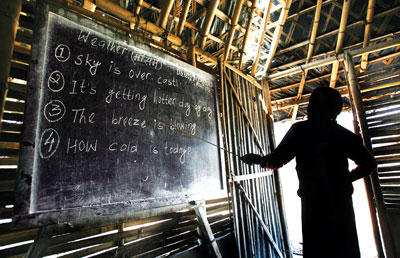|
Todd and Hargreaves met three families waiting to leave for New Zealand, the Magars, the Odaris, and the Subbas. They spoke to them of their troubled past, the wasted present, and the hopeful future. In the following months, they visited them in their new homes in the suburbs of Christchurch. The Weekend Press ran a special on the Bhutanese refugees in April 2010, excerpts of which have been reproduced here.
IN NEPAL
The small silver taxi van jolts along the dusty paths of Camp Sanischare as we scan for signs of Sector H2. As we pull to a stop, a crowd of curious children forms and stays close as we set off in search of Hut 3. Chicken peck at the dust in the narrow paths running between row upon row of bamboo mud huts. Old women raise surprised eyes from their sweeping and point us around corners until we arrive at the Magar family home. Though nominally identical, their hut stands out with its small, tidy garden, painted walls and straight bamboo fence.
Grandmother Chiniawati invites us in and quickly sends some children scurrying off to fetch her daughter Suk Maya and two grandchildren Sofiea and Anil Dip from school. Suk Maya arrives in a rush after being pulled away from her work as a supervisor at the Bajra Foundation, which distributes the large solar ovens dotting the camp. The 35-year-old's husband walked out years ago and her father died, leaving her to provide for the family.
"After staying 18 years in camps, I am hopeful to do something and have a fruitful life over there in New Zealand �I want to make my children part of the society," she says. Four generations of the Magar family had previously made their lives in Bhutan, where they were orange farmers. Suk Maya was just 16 when they were forced to leave their whole world behind. "I don't remember Bhutan, I'm just planning and dreaming about New Zealand," she says.
Before we leave with promises to see them again, the Magars pose for a photo outside their hut. Their smiles are genuine, but the grandmother's face reveals the strain of the unknown ahead of her.
IN NEW ZEALAND
Three weeks later, a large welcome party is assembled at Christchurch Airport. As the families arrive they are enveloped in hugs from relatives and introduced to their eager volunteer helpers. The Magar family grab their bags and set off towards their new home in Burnside. Their delight is evident at seeing their rooms. Heads poke into the linen cupboards and unsure hands glide across oven hobs and kitchen drawers. Everyone has a good look at the toilet and tests the water running from bathroom taps. Suk Maya says she can imagine starting a life in this "good place".
The women are enrolled in English classes and the children in local schools. Adjusting to change and life in New Zealand comes easily to most children, but older family members can struggle. "It should be like home here because I have no home," says Chiniawati. "I left Bhutan, I'm still new here, maybe after I settle in my new home I will be happy."
 Suk Maya Magar and her mother Chiniawati are greeted by family members and friends on arrival at Christchurch Airport. |
 Suk Maya Magar who spent half her life in a refugee camp marvels at the kitchen in her new home in New Zealand. |
 Khini Maya Subba and Harka Subba are dazzled by the choice at their first visit to a Christchurch supermarket. Food in the refugee camp was only-just-enough lentils and rice. |
 Padam Maya and husband Jai Narayan Odari start a new life in Christchurch with their son Bhim Kamar (17), grandson Anugrah, 2 months, and granddaughter Sinarika, 17 months. |
 |
 |
READ ALSO:
Gross national misery, CK LAL
"We will struggle for full democracy"
A fresh start, GOPAL GARTAULA in DAMAK
Endless goodbyes, GOPAL GARTOULA in JHAPA
Euro Bhutanis, GOPAL GURAGAIN
Can't wait to leave, KUNDAN ARYAL in JHAPA
No place like home, SHAILEE BASNET in JHAPA
Home away from home, ANUP KAPHLE in JHAPA
Long way from home, JOHN NARAYAN PARAJULI in JHAPA
http://www.stuff.co.nz/national/3618571/Home-after-20-years-in-a-refugee-camp



